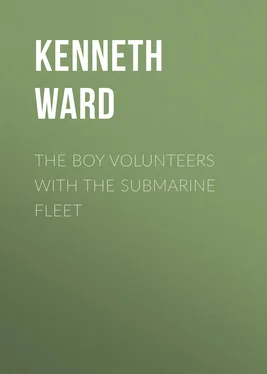Kenneth Ward - The Boy Volunteers with the Submarine Fleet
Здесь есть возможность читать онлайн «Kenneth Ward - The Boy Volunteers with the Submarine Fleet» — ознакомительный отрывок электронной книги совершенно бесплатно, а после прочтения отрывка купить полную версию. В некоторых случаях можно слушать аудио, скачать через торрент в формате fb2 и присутствует краткое содержание. Жанр: foreign_children, foreign_antique, foreign_prose, на английском языке. Описание произведения, (предисловие) а так же отзывы посетителей доступны на портале библиотеки ЛибКат.
- Название:The Boy Volunteers with the Submarine Fleet
- Автор:
- Жанр:
- Год:неизвестен
- ISBN:нет данных
- Рейтинг книги:4 / 5. Голосов: 1
-
Избранное:Добавить в избранное
- Отзывы:
-
Ваша оценка:
- 80
- 1
- 2
- 3
- 4
- 5
The Boy Volunteers with the Submarine Fleet: краткое содержание, описание и аннотация
Предлагаем к чтению аннотацию, описание, краткое содержание или предисловие (зависит от того, что написал сам автор книги «The Boy Volunteers with the Submarine Fleet»). Если вы не нашли необходимую информацию о книге — напишите в комментариях, мы постараемся отыскать её.
The Boy Volunteers with the Submarine Fleet — читать онлайн ознакомительный отрывок
Ниже представлен текст книги, разбитый по страницам. Система сохранения места последней прочитанной страницы, позволяет с удобством читать онлайн бесплатно книгу «The Boy Volunteers with the Submarine Fleet», без необходимости каждый раз заново искать на чём Вы остановились. Поставьте закладку, и сможете в любой момент перейти на страницу, на которой закончили чтение.
Интервал:
Закладка:
"Jump as far as you can!" shouted the captain.
Ralph placed a foot on the railing, and, looking back at Alfred, said: "Here goes! Come on!"
Both boys landed at almost the same time. The little girl was aroused by the cold water, and was wildly floundering about, but the cripple lay upon the surface of the water, with face upturned, limp and still. They glanced about; where were the boats? They could not be far away.
"I am afraid he's done for," said Alfred, as he glanced toward the cripple.
"Well, we might as well stay near him; he might be all right," replied Ralph.
"Move away from the ship quickly," said a voice in the water, not far away.
It was the captain. He was the last one to dive, after he had seen every passenger safely off the ship.
"We have no time to lose; take care of yourselves; I will help the little girl," he continued, as he threw the child on his back, and began to strike out.
The sea had been calm up to this time, but no sooner had the captain ceased speaking than a tremendous wave almost engulfed them; they seemed to be carried up, and then were forced down by a giant swell. Another wave followed and then another, until, finally, the oscillations of the waves seemed to be growing less and less.
"Where is the ship?" cried Alfred.
"She's gone down; that's what made the waves," said the captain.
The cripple's hand was raised up, and his eyes began to roll.
"This fellow's all right, after all," said Ralph. "I'll help him. I wonder where the boats are?"
The sun, which was going down while all this had been taking place, had now disappeared, and there was that gray, lead-like appearance on the waves that comes just before twilight.
"Keep up your courage, boys; we shall soon have plenty of boats looking for us," said the captain.
Within less than a minute thereafter two boats could be seen bobbing up and down not far away, heading straight for those in the water. Ralph was the first one caught by the strong arm of a seaman, and then the little girl, now fully recovered from her fright, received the care of a woman in the boat.
Alfred assisted the cripple into the other boat, and the captain ordered all the passengers transferred to the boat which had just come up.
The boys then noticed that only three seamen remained, together with the captain and first officer.
"You may remain with us," said the captain, addressing Ralph and Alfred.
This was, indeed, a compliment to them, which was appreciated.
"I know father, mother and auntie are all right," said Alfred. "Do you think they saw us get off?" he added anxiously.
"They were standing by when you jumped, but when the ship made the last lurch, just before she went down the seamen knew that they must pull away to avoid being sucked under. It might have been too dark for them actually to have seen you get away, at the distance they were from the ship, but I don't think they will expect to see us before morning."
"Why, do you intend to stay here all night?" asked Ralph.
"No, but each boat crew has had instructions to make for the nearest port, as rapidly as possible," replied the captain.
"Where are we now?" asked Alfred.
"In the Bay of Biscay, about one hundred and fifty miles from the nearest land," answered the captain.
"How long will it take us to reach land?" asked Ralph.
"Possibly two days, or more; that depends on the weather and the conditions in the bay. This is the most turbulent body of water anywhere on the Atlantic coast line, but it has been remarkably smooth during the past twenty-four hours," answered the captain.
"What is the name of the place that we are heading for?" asked Ralph.
"St. Nazaire; a French town at the mouth of the river Loire," was the reply.
It was now quite dark, and a haze prevented the occupants of the boat from making any observation of the stars, hence the sailing, or rather, the rowing, had to be conducted by compass entirely, the order being given by the captain to steer east by north, a term which indicates that the course was exactly two points north of a line running due east and west.
Three miles an hour at the outside, would be considered good speed. Sails would have been useless without a wind, and there was not the slightest breeze, but about midnight there was an apparent rocking in the little boat that indicated a wind. Occasionally, there would be a jerk, as the boat would be thrown from one side to the other. The captain was awake and alert, but the boys were lying in the bottom of the vessel near the stern.
It was a trying, weary night, and when the sun arose the sea was one panorama of short, choppy waves. The seamen were tired with rowing, and it was evident that no great effort was being made to hurry the boat along.
"It does seem to me that the sun is coming up on the wrong side this morning," remarked Alfred, as they were partaking of the food prepared and stowed in the boat's lockers.
"I imagine you are turned around somewhat," replied the captain. "The wind is now coming from the east, and you see the sun almost ahead of us. We are being carried west faster than the rowers can take us eastward, hence we are practically standing still, or rather going back, and they are now merely holding the boat so as to give us steerage way and prevent us from going into the troughs between the waves."
"Have you sighted either of the other boats?" asked Alfred.
"No; but one of the men observed a light at two this morning, three points to starboard, which was, possibly, one of our companions, but since that time we have searched the seas fruitlessly," answered the captain.
"I don't know why it is that if all of the boats steer to the same point that they should be scattered in this way," said Alfred. "Can you explain it, Captain?"
"It would not be so if in the open sea, or in mid-ocean; there they would be likely to keep together, or not separated more than three or four miles; but it is quite another thing in this great bay," replied the captain.
"Why should it be different here?" asked Ralph.
"If you will take a map of the western part of Europe, you will notice three great projecting headlands, or points on the western shore of the continent of Europe, namely, Iceland, in the north, and the Spanish peninsula in the south. Midway between you will notice Ireland and the British Isles. The great Gulf stream comes down from the north, passes Iceland, that is one branch, hugs the coast of Ireland, and strikes the point of land which projects out northwesterly from the main Spanish land, so that a sort of maelstrom is set up in the bay."
"How far are we from that point of land?" asked Ralph.
"About two hundred miles northeast; and I may also say that we are just about in the middle of the Bay of Biscay, and at that point where the sea is always more quiet than at any other part," answered the captain.
"Ship to starboard, sir," sang out the forward watch.
The captain turned to the right and, after a brief glance, lowered his hand. The boys looked at him in wonder. Evidently the sight of the vessel did not give him pleasure. It was a low-lying craft, with two short masts.
"That looks like a submarine," shouted Ralph.
"You are right," replied the captain.
The submarine was coming forward rapidly, and within fifteen minutes it was within hailing distance. They now had an opportunity to examine the ugly thing with the long black back and the conning tower midway between the ends.
"Are those the periscopes?" asked Alfred. "I didn't know they carried two of them."
"That is the practice now," said one seamen.
The submarine came straight toward them, then sheered off and stopped alongside less than thirty feet from the boat. One of the seamen tossed a rope, which was grasped by a marine on the undersea boat, and in that manner they were drawn close up to the side of the submarine.
Читать дальшеИнтервал:
Закладка:
Похожие книги на «The Boy Volunteers with the Submarine Fleet»
Представляем Вашему вниманию похожие книги на «The Boy Volunteers with the Submarine Fleet» списком для выбора. Мы отобрали схожую по названию и смыслу литературу в надежде предоставить читателям больше вариантов отыскать новые, интересные, ещё непрочитанные произведения.
Обсуждение, отзывы о книге «The Boy Volunteers with the Submarine Fleet» и просто собственные мнения читателей. Оставьте ваши комментарии, напишите, что Вы думаете о произведении, его смысле или главных героях. Укажите что конкретно понравилось, а что нет, и почему Вы так считаете.












